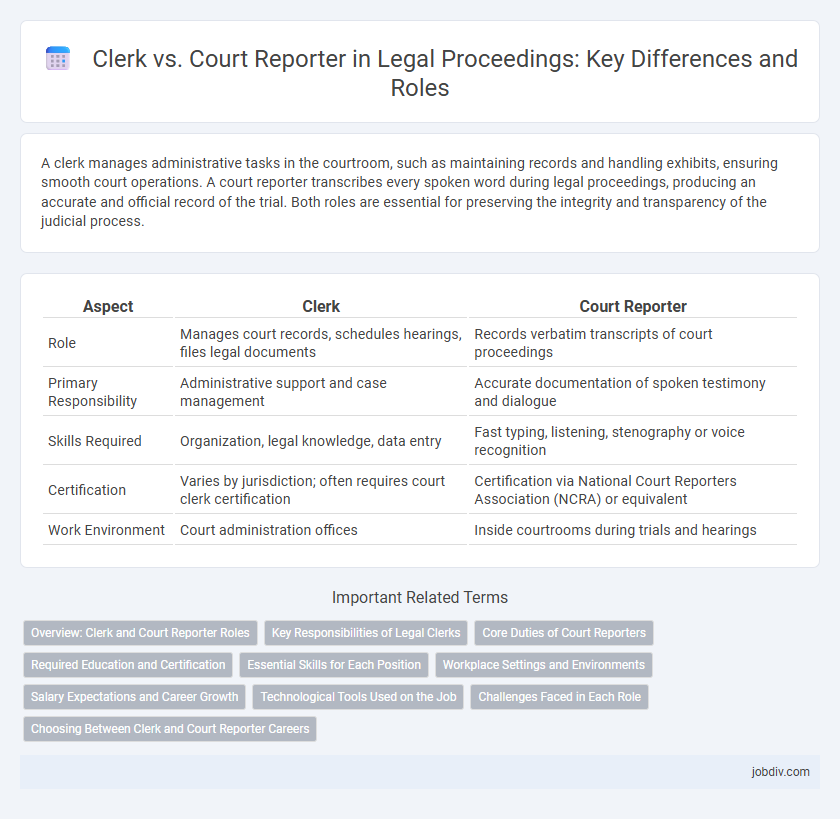A clerk manages administrative tasks in the courtroom, such as maintaining records and handling exhibits, ensuring smooth court operations. A court reporter transcribes every spoken word during legal proceedings, producing an accurate and official record of the trial. Both roles are essential for preserving the integrity and transparency of the judicial process.
Table of Comparison
| Aspect | Clerk | Court Reporter |
|---|---|---|
| Role | Manages court records, schedules hearings, files legal documents | Records verbatim transcripts of court proceedings |
| Primary Responsibility | Administrative support and case management | Accurate documentation of spoken testimony and dialogue |
| Skills Required | Organization, legal knowledge, data entry | Fast typing, listening, stenography or voice recognition |
| Certification | Varies by jurisdiction; often requires court clerk certification | Certification via National Court Reporters Association (NCRA) or equivalent |
| Work Environment | Court administration offices | Inside courtrooms during trials and hearings |
Overview: Clerk and Court Reporter Roles
Clerks manage court records, schedule hearings, and handle administrative functions critical to court operations, ensuring accurate documentation and procedural compliance. Court reporters specialize in transcribing verbal proceedings verbatim, producing official transcripts that serve as accurate records for appeals and legal reference. Both roles are essential for maintaining the integrity and efficiency of judicial processes through precise documentation and administrative support.
Key Responsibilities of Legal Clerks
Legal clerks manage case documentation, organize evidence, and maintain accurate records essential for court proceedings. They assist attorneys by conducting legal research and preparing case files to ensure procedural compliance. Their role supports the legal team by facilitating efficient workflow and reducing errors in the legal process.
Core Duties of Court Reporters
Court reporters are responsible for creating accurate, verbatim transcripts of legal proceedings, ensuring every spoken word is documented without omission or error. They utilize specialized equipment, such as stenotype machines or voice writing technology, to capture dialogue in real-time, enabling precise record-keeping essential for appeals and legal references. Their core duties include transcribing testimonies, preserving court records, and providing official documentation that supports the judicial process with accuracy and reliability.
Required Education and Certification
Clerks typically need a high school diploma or GED, with some positions requiring an associate degree or specialized legal coursework, while court reporters must complete a court reporting program and obtain certification such as the Registered Professional Reporter (RPR) credential. Court reporters often undergo rigorous training in stenography and possess certification from the National Court Reporters Association (NCRA), ensuring accuracy in transcription and real-time reporting. Clerks may pursue certifications like the Certified Clerk of Court (CCC) to advance their legal administrative skills, but court reporters face stricter educational standards tied to technical proficiency.
Essential Skills for Each Position
A court clerk must possess strong organizational skills, attention to detail, and proficiency in legal terminology to manage records, schedules, and court documents efficiently. Court reporters require exceptional listening skills, fast and accurate shorthand or stenography abilities, and familiarity with transcription technology to produce verbatim records of legal proceedings. Both roles demand a thorough understanding of courtroom protocol and the ability to maintain confidentiality under legal standards.
Workplace Settings and Environments
Clerks typically work in office environments within court buildings, handling administrative tasks such as managing case files and scheduling hearings. Court reporters are often positioned in courtrooms, equipped with specialized stenography machines to transcribe proceedings verbatim. Both roles require close interaction with judicial staff but differ in workspace setup and equipment tailored to their specific functions.
Salary Expectations and Career Growth
Clerks typically earn an average annual salary ranging from $30,000 to $50,000, while court reporters command higher wages, often between $50,000 and $90,000, depending on experience and location. Career growth for court reporters is promising due to specialized skills in transcription and courtroom technology, leading to opportunities in legal firms, broadcasting, and freelance work. Clerks experience steady advancement within court administration but generally have fewer high-paying opportunities beyond entry-level roles.
Technological Tools Used on the Job
Court reporters utilize advanced stenography machines and real-time transcription software to capture verbatim records of proceedings with high accuracy. Clerks rely on case management systems, digital filing platforms, and scheduling software to efficiently organize court documents and track case progress. Both roles increasingly incorporate cloud-based technologies and electronic databases to streamline workflow and improve data accessibility in modern legal environments.
Challenges Faced in Each Role
Clerks often face challenges related to managing vast amounts of case files and ensuring accurate administrative records within tight deadlines, which can impact courtroom efficiency. Court reporters encounter difficulties in producing verbatim transcripts in real-time, requiring exceptional concentration and proficiency with specialized equipment to avoid errors. Both roles demand meticulous attention to detail and the ability to handle high-pressure situations to support judicial processes effectively.
Choosing Between Clerk and Court Reporter Careers
Choosing between clerk and court reporter careers involves evaluating job responsibilities, required skills, and career growth opportunities in the legal field. Court clerks handle administrative duties, manage case files, and support courtroom operations, requiring strong organizational skills and legal knowledge. Court reporters specialize in transcribing spoken words during legal proceedings, demanding exceptional typing speed, accuracy, and familiarity with legal terminology.
Clerk vs Court Reporter Infographic

 jobdiv.com
jobdiv.com